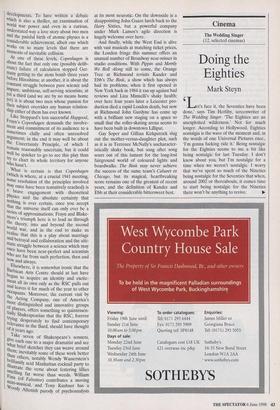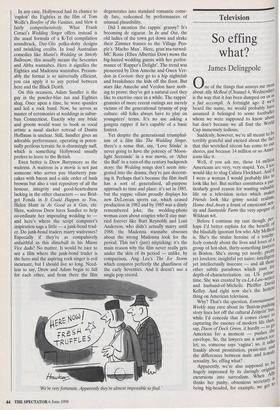Cinema
The Wedding Singer
(12, selected cinemas)
Doing the Eighties
Mark Steyn Let's face it, the Seventies have been done,' says Tim Herlihy, screenwriter of The Wedding Singer. 'The Eighties are an unexploited wilderness.' Not for much longer. According to Hollywood, Eighties nostalgia is the wave of the moment and, in the words of one Universal Pictures exec., 'I'm gonna fucking ride it.' Being nostalgic for the Eighties seems to me a bit like being nostalgic for last Tuesday. I don't know about you, but I'm nostalgic for a time when we weren't nostalgic. I worry that we've spent so much of the Nineties being nostalgic for the Seventies that when, around 2002 or thereabouts, it comes time to start being nostalgic for the Nineties there won't be anything to revive. ■ In any case, Hollywood had its chance to 'exploit' the Eighties in the film of Tom Wolfe's Bonfire of the Vanities, and blew it fairly comprehensively. What Frank Coraci's Wedding Singer offers instead is the usual formula of a K-Tel compilation soundtrack, Day-Glo polka-dotty designs and twinkling credits. In loud Australian comedies like Muriel's Wedding or Strictly Ballroom, this usually means the Seventies and Abba wannabes. Here it signifies the Eighties and Madonna wannabes. Presum- ably the format is so universally efficient, you can apply it to any period between here and the Black Death.
On this occasion, Adam Sandler is the guy in the powder-blue tux and Eighties shag. Once upon a time, he wore spandex and led a rock band. Now, he serves as master of ceremonies at weddings in subur- ban Connecticut. Exactly why any bride and groom would want to book as vocal artiste a nasal slacker retread of Dustin Hoffman is unclear. Still, Sandler gives an adorable performance, operating in poten- tially perilous terrain: he is charmingly naff, which is something Hollywood usually prefers to leave to the British.
Even better is Drew Barrymore as the waitress. A waitress in a movie is not just someone who serves you blueberry pan- cakes with bacon and a side order of hash browns but also a vast repository of all the honour, integrity and good-heartedness lacking in the other characters — see Brid- get Fonda in It Could Happen to You, Helen Hunt in As Good as it Gets, etc. Here, waitress Drew hires Sandler to help co-ordinate her impending wedding to — and here's where the script computer's inspiration sags a little — a junk-bond trad- er. Do junk-bond traders many waitresses? Especially if they're as compulsively unfaithful as this slimeball in his Miami Vice duds? No matter. It would be nice to see a film where the junk-bond trader is the hero and the aspiring rock singer is evil incarnate, but I should live so long. Need- less to say, Drew and Adam begin to fall for each other, and from there the film degenerates into standard romantic come- dy fare, redeemed by performances of unusual plausibility.
Did I mention the rappin' granny? It's becoming de rigueur. In In and Out, the old ladies of the town get down and shake their Zimmer frames to the Village Peo- ple's 'Macho Man'. Here, gran'ma-turned- MC Rosie (Ellen Albertini Dow) wows the big-haired wedding guests with her perfor- mance of 'Rapper's Delight'. The trend was pioneered by Don Ameche and Gwen Ver- don in Cocoon: they go to a hip nightclub and breakdance the kids off the floor. But stars like Ameche and Verdon have noth- ing to prove: they've got a natural cool they like to exercise once in a while. The rappin' grannies of more recent outings are merely victims of the generational tyranny of pop culture: old folks always have to play on youngsters' terms. It's no use asking a gangsta rapper if he's capable of a basic foxtrot.
Yet despite the generational triumphal- ism of a film like The Wedding Singer, there's a sense that, say, 'Love Stinks' is never going to have the potency of 'Moon- light Serenade' in a war movie, or 'After the Ball' in a turn-of-the century backporch story: the Wedding songs don't seem inte- grated into the drama; they're just decorat- ing it. Perhaps that's because the film itself has a sort of generalised, all-purpose approach to time and place: it's set in 1985, but the yuppie villain proudly displays his new DeLorean sports car, which ceased production in 1982 and by 1985 was a dimly remembered joke; the wedding-photo woman coos about couples who'll stay mar- ried forever like Burt Reynolds and L,oni Anderson, who didn't actually many until 1988; the Madonna wannabe obsesses about the wrong Madonna look for the period. This isn't (just) nitpicking: it's the main reason why the film never really gets under the skin of its period — unlike, by comparison, Ang Lee's The Ice Storm which conjures perfectly the ghastliness of the early Seventies. And it doesn't use a single pop record.
'We're very fortunate. Apparently they're almost impossible to find.'



























































 Previous page
Previous page